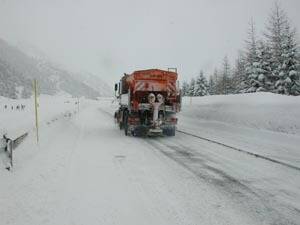Ecology in winter service

Any means is fair - in the right place
It is necessary to be prepared for the white days and nights, but with what to banish the danger of black ice? With salt, brine or grit?
On the entire network of main roads in the Principality of Liechtenstein, salt and brine (33% salt solution) are used as de-icing agents following snow removal.
Environmental protection and economic efficiency
Increased environmental awareness and a reluctance to incur excessive costs, have turned blanket blacktop clearing into differentiated winter maintenance. The motto is "as much as necessary, as little as possible." The winter road clearance service on Liechtenstein roads is first and foremost committed to traffic safety, and secondly to environmental considerations. However, it must additionally be oriented to the modern requirements of the national economy and the budgets of the road services.
High-quality salt used sparingly and efficiently
The salt used as a de-icing agent in Liechtenstein comes from the Swiss Rheinsaline in Pratteln. Since this salt does not contain any of the substances magnesium and calcium, which are considered aggressive, but only sodium chloride, it is a very advantageous product. Modern tools also make it possible today to achieve the same effect with 5 - 10 grams of salt per square meter of icy road as in the past, when 30 grams and more were scattered.
Grit with poor eco-balance
With grit, experience has shown that safety on icy and snowy roads improves only for a short time at a time. Another disadvantage is that grit has a poor life cycle assessment. The fine-grained material must be spread in much larger quantities than salt. In addition, grit produces the dreaded fine dust when roads dry up. Finally, this fine dust remains in the roadside ditch, in the adjacent meadows or in the sewage treatment plant and has to be disposed of as hazardous waste in a very complex process.